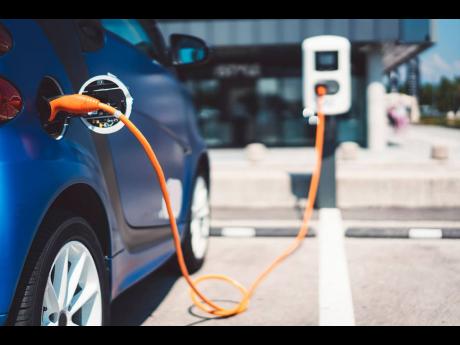Editorial | Rethink EV incentives
When Prime Minister Andrew Holness speaks in the Budget Debate next week, we expect that he will correct what is likely to have been an error by Finance Minister Nigel Clarke about the policy on electric vehicles (EVs). The PM will probably confirm that the Government will be far more aggressive in encouraging their importation than Dr Clarke suggested.
For, as Russia’s war against Ukraine has emphasised, and Dr Clarke indicated, it is now far more urgent that Jamaica “rid ourselves of this unhealthy dependence on oil”. Replacing internal-combustion engine (ICE) vehicles is one part of the strategy – except for the illogic of the stated policy. Another plank of Jamaica’s effort to wean itself off oil must be accelerating the conversion of the electricity grid to renewables.
Late last year, before Russia’s President Vladimir Putin began to seriously ratchet up tensions along his country’s border with Ukraine, the price of oil hovered in the region of US$75 a barrel. After Mr Putin sent his troops into Ukraine a fortnight ago, it quickly jumped to the US$100 range. This week, when the United States banned the importation of Russian oil, the commodity quickly shot close to US$140 a barrel.
NO LONGER HERESY
While crude prices have fallen back a bit, it is no longer heresy in the world of commodities, as it was a few years ago, to talk of the possibility of US$200 oil. Dr Clarke’s J$912-billion Budget, which parliamentarians have been mulling over for several weeks, was predicated on oil at US$67.50 a barrel.
Fossil fuel, the bulk of which is oil, accounts for upwards of 80 per cent of Jamaica’s energy needs. The nearly 21 million barrels of the petroleum the island imported in 2020 cost over US$1 billion, or nearly a fifth of the value of all imports. Nearly a third (32 per cent) of the imported oil is used in the transportation sector. But the price of oil burrows deep into the economy.
“Having such dependence on oil for our energy needs is a risk to Jamaica’s economic security,” Dr Clarke said this week.
The minister was right in that assertion, as is the Government’s intention to displace ICE vehicles with EVs. This newspaper’s problem, however, is with how long it would take, under the administration’s declared plan, to get a significant displacement of petrol-burning vehicles. The idea needs clarity.
While there is no readily available breakdown of the categories, there were approximately 522,000 vehicles registered in the island in 2020, of which nearly 74,000 were licensed public passenger vehicles. There were seven per cent fewer licensed passenger vehicles than in 2019.
As Dr Clarke pointed out, with current battery technology, electric vehicles are up to a third cheaper to operate than ICE ones. Clearly, they are certainly better for the climate. It is logical, therefore, that the Government intends to promote EVs – of a sort.
“Eventually, in a decade, electric vehicles need to be 100 per cent electrically powered,” Dr Clarke said. While that timeline may be more aspirational than realistic, we get the point. Not, however, the logic of the strategy to kick-start the transition to EVs.
Dr Clarke announced that duties on EVs are reduced from 30 per cent to 10 per cent ”for an initial five years”. Then came the kicker: there will be a cap of 1,000 EVs to enjoy this incentive, “because the duties on motor vehicles are such a big part of government revenue”.
OBVIOUS QUESTION
An obvious question is, which hand, the market’s or a bureaucrat’s, will allocate these 1,000 preferences or a lottery? Further, given the likely higher upfront cost for a new EV, why would someone who missed out on the tariff relief feel inclined to purchase an electric-powered vehicle at the higher cost? Indeed, with the incentive being available for 1,000 EVs, or 5,000 over five years, it would seem that only richer people, in the absence of the incentive or a dramatic fall in prices, will buy EVs.
Yet, electric vehicles would help to lift Jamaica’s stagnant consumption of electricity (growth of one per cent a year) and, as Dr Clarke said, allow the island to install more renewable generation capacity, the costs of which have been falling. Increased consumption of electricity that is paid for should also allow power providers to lower their costs to consumers. Which would be good for the economy.
In that context, the Government’s revenue consideration notwithstanding, this timid policy posture of the Government is, on the face of it, counter-intuitive. It should be revisited.
Further, in parallel with a credible EV policy, the energy and technology minister, Daryl Vaz, should be hastening his pace in calling for proposals for renewables, to accelerate the Government’s plan to increase renewables. The Government’s declared intention is to lift the contribution of renewables to Jamaica’s power grid from the current 17 per cent to 32 per cent by 2030, and to 49 per cent by 2037.
In today’s circumstances, those dates are too far away.

